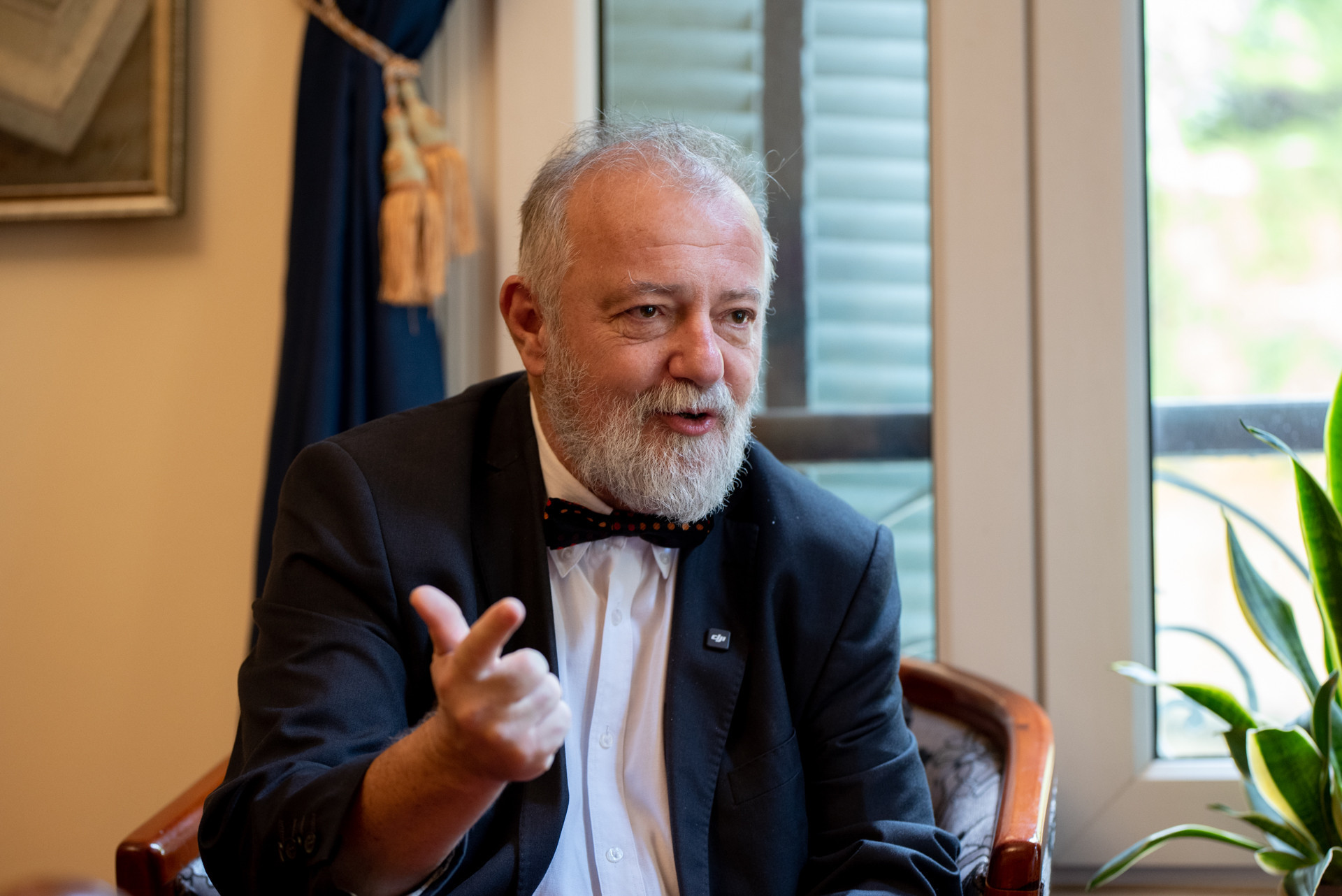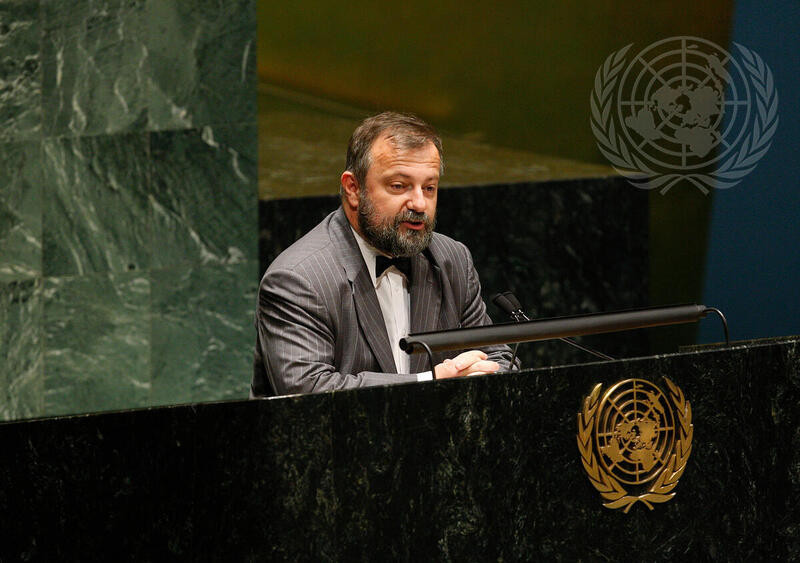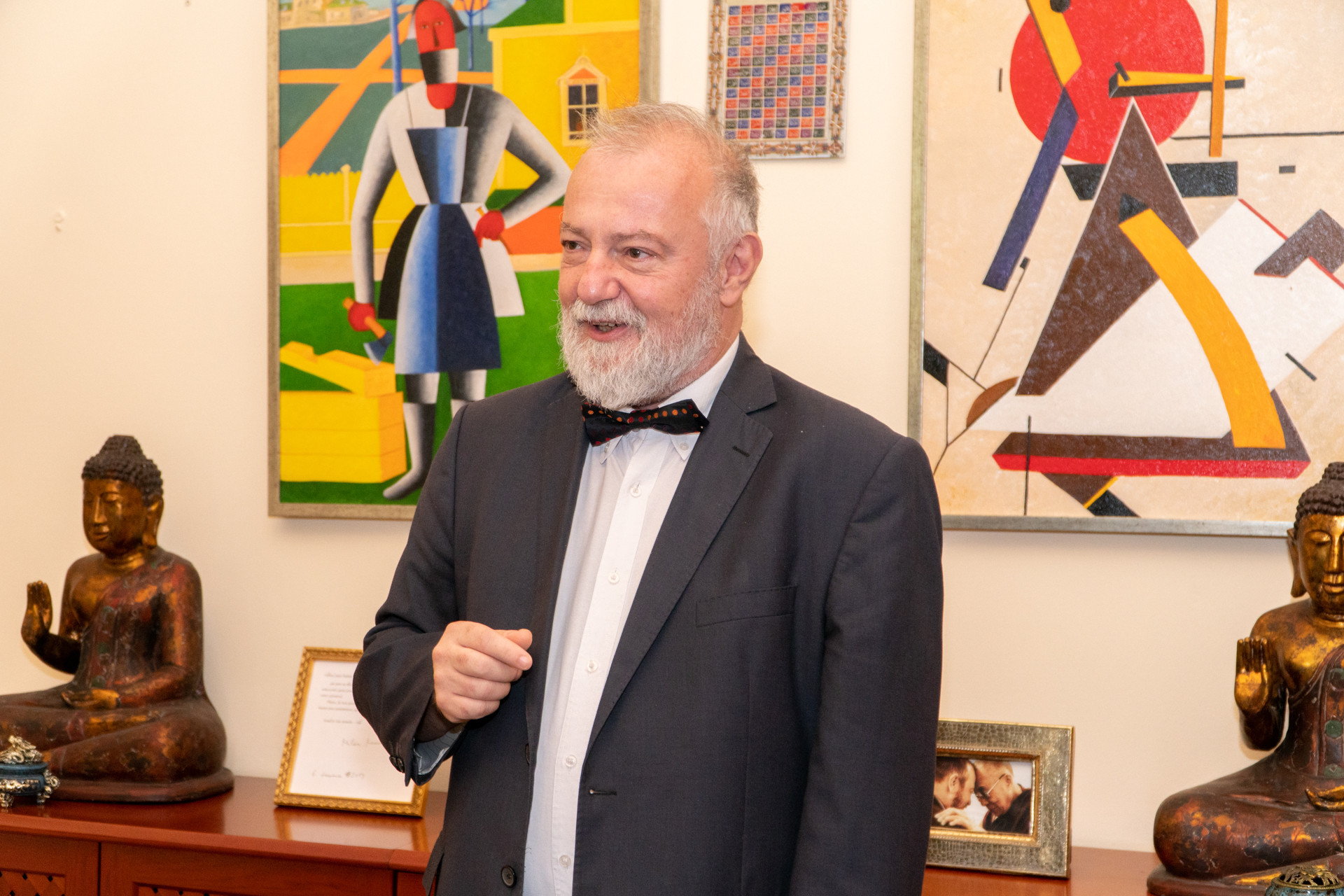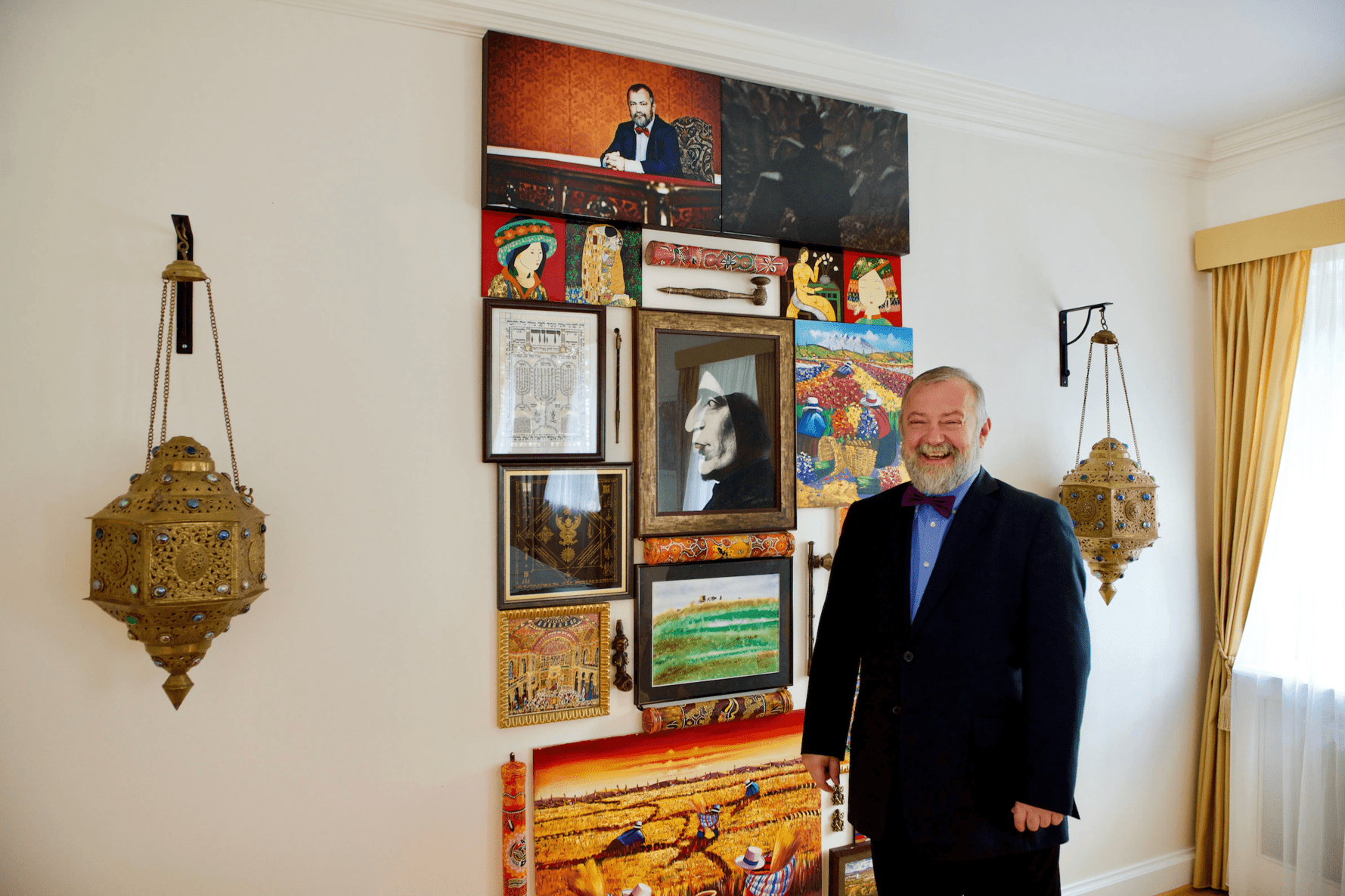VietNamNet spoke with the Czech Ambassador to Vietnam, Hynek Kmoníček, about the role of small countries in a world filled with conflict and turmoil.

You have spent considerable time researching the Middle East, including earning your Ph.D. at Hebrew University in Jerusalem, Israel. What is your philosophy on conflict resolution and peacebuilding?
Ambassador Hynek Kmoníček: This question addresses an extremely complex issue that I often contemplate. My experiences living and working in the Middle East have shown me that protracted conflicts are not simple problems with straightforward solutions. Some conflicts are so deep-rooted and intricate that we can only manage them rather than eliminate them.
Take, for example, the Israel-Palestine conflict, which has persisted for decades. It involves vastly different histories, cultures, and political demands, making a perfect solution nearly impossible. However, this does not mean we should give up. Preventing conflicts from escalating and maintaining a relatively peaceful state is a critical objective. We need to focus on building trust, promoting dialogue, and seeking temporary solutions to reduce tensions. This approach is applicable in many contexts.
In the Middle East, history has demonstrated that cycles of conflict and peace are inevitable. The role of diplomacy is to extend periods of peace, minimize harm, and allow future generations to find more sustainable solutions.
How do countries like Vietnam and the Czech Republic play a role in a world filled with conflict and volatility today?
Ambassador Hynek Kmoníček: As countries in unique geographical positions, we often face numerous challenges. Historically, both Vietnam and the Czech Republic have dealt with pressures from major powers. How these nations respond to such challenges has significantly shaped their futures.
The Czech Republic, situated between two major powers - Germany and Russia - has learned to cope with external pressures since the establishment of the Kingdom of Bohemia in 840. Similarly, Vietnam has demonstrated resilience and wisdom throughout its long history, which spans over 2,000 years. Vietnam has faced various powers, from China to France and the United States, particularly in the 19th and 20th centuries, emerging stronger each time.
Consequently, Vietnam has the potential to lead other countries in the region amid the ongoing U.S.-China competition.

Indeed, both Vietnam and the Czech Republic have maintained their independence through centuries of geopolitical turmoil. How does this influence your belief in multilateral diplomacy, such as through the United Nations?
Ambassador Hynek Kmoníček: Absolutely. The historical experience of the Czech Republic reinforces my belief in the crucial role of multilateral diplomacy. The United Nations serves as a global forum where nations, regardless of size, can come together to address common challenges.
While limitations exist - particularly with hard power playing a significant role, especially within the Security Council - the UN symbolically creates a level playing field. For instance, regardless of their size, countries like the Solomon Islands and the United States each have equal votes in the General Assembly.
What I value most about the UN is its ability to create a neutral space where countries can engage in dialogue and seek solutions to complex problems. The issue of Jerusalem, for example, is a challenging conundrum without a perfect solution, necessitating the establishment of a UN committee to address it. This is how peace can be extended; otherwise, resolving such issues becomes exceedingly difficult. This exemplifies the essence of multilateral diplomacy - finding ways to prevent conflict, even when root causes cannot be entirely resolved.
In your opinion, what is the primary purpose of diplomacy? Is it to manage conflict and prevent escalation, or to preserve peace as best as possible?
Ambassador Hynek Kmoníček: Ultimately, diplomacy is the art of finding common ground. It involves building bridges and fostering cooperation, even amidst seemingly opposing circumstances.
The Czech Republic and Vietnam provide strong examples of preserving peace. For instance, consider Vietnam's relationship with ASEAN. Similarly, the Czech Republic navigated divisions with the Western bloc during the Cold War, eventually becoming a NATO member. This evolution demonstrates that, with time and effort, countries can change their relationships and discover common interests through continuous dialogue. I believe both our nations have valuable lessons to share with the world.

Before coming to Vietnam, you held several significant positions, including Czech Ambassador to the United States, Australia, and India; Senior Foreign Policy Advisor to the President; and Ambassador to the United Nations. What motivated you to accept the post in Vietnam?
Ambassador Hynek Kmoníček: I was eager to serve in a country that holds substantial importance for the Czech Republic. Vietnam is our most significant partner in Asia, partly due to the large Vietnamese community in the Czech Republic and the nearly 75-year diplomatic relationship between our two nations. After my tenure in Washington, Vietnam represents the perfect destination to balance work and personal life while continuing a meaningful career.
It is estimated that around 60,000 to 80,000 Vietnamese live in the Czech Republic, making them one of the largest Vietnamese communities abroad. Can you elaborate on their role in Czech society, politics, and culture?
Ambassador Hynek Kmoníček: According to official figures, approximately 65,000 Vietnamese currently reside in the Czech Republic, although the actual number may be significantly higher. This community is rapidly growing and is now the fourth largest in the country, following Czech, Slovak, and Ukrainian communities due to recent conflicts.
The contributions of this community to Czech society are undeniable. When the first Vietnamese arrived in Czechoslovakia in 1956, few could have imagined they would become an integral part of our society. A notable example is a Vietnamese editor specializing in proofreading Czech manuscripts for one of our major newspapers. Many were surprised to learn he was Vietnamese when they first heard his voice over the phone and later met him in person.
The Vietnamese community has achieved remarkable success and is among the most successful ethnic minority communities in the Czech Republic, with outstanding members across various fields.

Given the success and significance of this community, do they influence your role as ambassador in promoting relations between the two countries?
Ambassador Hynek Kmoníček: They are indeed an invaluable resource. Without the Vietnamese community, we would not have the strong presence we currently enjoy in Vietnam. They highly value family traditions and maintain regular contact with relatives in Vietnam, particularly in Hanoi and the northern regions. Over the years, the Czech-Vietnamese community has significantly contributed to Czech investments in Vietnam. The money they earn in the Czech Republic is often reinvested back into Vietnam, especially in their regions of origin. We strive to encourage and support these efforts as much as possible.
This connection enhances our understanding of the local situation, particularly given the language barriers. Having such a supportive community is invaluable, as they help us gather accurate information about domestic conditions and opportunities for expanding cooperation between Vietnam and the Czech Republic.
The Vietnamese community is also actively promoted in the Czech Republic. Currently, the Czech Ethnographic Museum is hosting a major exhibition on Vietnamese history, which will last for a year and a half. This exhibition features fascinating information, ranging from the first Czech Jesuit priest who arrived in Vietnam in the 17th century to my current activities as ambassador. The anticipated 18-month duration of this exhibition is a testament to its significance, as such lengthy exhibitions are rare in Europe, where even major exhibitions typically last only 3 to 6 months.
I find it surprising that there are currently no direct flights between Hanoi and Prague. Do you think there is potential to establish such flights in the future?

Ambassador Hynek Kmoníček: I completely agree. There was previously a direct flight operated by Bamboo Airways, but it was canceled following the COVID-19 pandemic. We are actively negotiating with VietJet and Vietnam Airlines to restore direct flights between Hanoi, Ho Chi Minh City, and Prague, ideally with a frequency of at least two flights per week.
However, for these flights to operate effectively from a commercial standpoint, we must address two main issues: cargo and visas. The requirement for Czech citizens to obtain a visa for Vietnam remains a significant barrier to developing tourism potential. Simplifying entry procedures for Czech citizens would dramatically enhance the landscape for travel.
For example, since Phu Quoc adopted a visa exemption policy, the number of Czech tourists visiting has significantly increased, with charter flights carrying between 400 to 900 passengers weekly. This clearly illustrates the importance of visa policies in promoting tourism.
Vietnam can attract even more tourists and increase tourism revenue by eliminating reliance solely on visa fees. Rather than charging a $25 visa fee, Vietnam could benefit much more from the expenditures of tourists within the country. While $25 may seem trivial, it serves as a barrier, leading many Czech travelers to choose alternative destinations like Thailand, which offers visa exemption and greater English accessibility.
Thus, I always emphasize the importance of simplifying visa procedures to support the implementation of direct flights.
In addition to the Vietnamese community, attracting a substantial number of Czech tourists and cargo is crucial for ensuring the economic viability of these flights. When these three elements are combined, airlines will be able to secure stable revenues when opening new routes.
You have an interesting journey from a musician to a diplomat. What makes the field of diplomacy so appealing to you?

Ambassador Hynek Kmoníček: Diplomacy is a field rich in tradition, and certain experiences are only meaningful when encountered firsthand.
For instance, the strict dress code diplomats adhere to might seem trivial at first glance. However, how a diplomat presents themselves reflects respect for their counterparts and establishes a professional image. Dressing appropriately ensures that what you say is taken seriously. As a diplomat, you represent not only yourself but an entire nation.
When you enter an important meeting dressed well, your counterpart is likely to focus on your message. Conversely, if you appear with an eccentric outfit, such as a bright pink feather, all attention will divert to your appearance rather than the substance of your conversation. This is why diplomats adhere to established codes of conduct, even if they seem rigid.
Dress codes, communication styles, and diplomatic rituals serve as tools for building a professional and trustworthy image. This principle resonates with certain traditions in Asia, where seemingly unnecessary rituals play a crucial role in maintaining community cohesion.
Many Europeans may struggle to comprehend Asian culture, and diplomacy operates on similar principles. Rules of conduct that might appear simple lay the foundation for building lasting relationships.
How do you bridge cultural gaps, particularly between Europe and Asia?
Ambassador Hynek Kmoníček: The first and most important aspect is maintaining an open mind. We cannot compel others to conform to our standards. Diplomacy is not a battle; it is a dance in which both parties must find ways to harmonize.
To cultivate a good relationship, mutual understanding is essential. We must listen, empathize with the other party's perspective, and seek common ground. When we comprehend why others think and act as they do, we can discover appropriate solutions.
One of the greatest challenges for a diplomat is balancing integration with the preservation of one's identity. How can I understand Vietnam without fully becoming Vietnamese? My role is to grasp Vietnam's needs while retaining my own identity.
Gaining profound knowledge of the culture of the host country is crucial, yet we must remember that we represent our own nation. Becoming a native is unnecessary and can lead to misunderstandings. The art of diplomacy lies in connecting with other cultures without losing oneself; it is a continuous learning process that requires patience, skill, and an open heart.

Do you have any advice for young people aspiring to enter the field of diplomacy?
Ambassador Hynek Kmoníček: Diplomacy is a career requiring passion and significant sacrifice. Before embarking on this path, young people must understand the challenges associated with the profession.
The life of a diplomat is not merely characterized by luxurious trips and high-level meetings; it often involves extended periods away from home, adapting to new environments, and constant change.
Frequent relocations can present challenges for both individuals and their families. Children must adjust to new educational settings, and partners may face difficulties integrating into different cultures.
I often liken diplomacy to military life. You need to be psychologically and mentally prepared to navigate these transitions.
Moreover, diplomats must be ready to cope with feelings of loneliness and homesickness. After years abroad, one may feel like a guest in their own country. Nonetheless, these diverse and enriching experiences foster personal growth and deepen insights into the world.
Therefore, before deciding to pursue a diplomatic career, individuals should consider whether they are truly ready for such a lifestyle. If stability is your preference, diplomacy may not be the right choice.
However, if you are passionate about exploration, enjoy communication, and wish to contribute to your country, this can be an intriguing and meaningful profession.
I happened to learn an interesting fact about you while reading your biography – you are known for the passion for cooking, collecting art, and frequently enjoying cultural activities such as music and film. What role can cultural diplomacy play as a bridge in this field?
Ambassador Hynek Kmoníček: Cultural diplomacy is not only a diplomatic tool but also a bridge between cultures. Sharing personal interests, such as cuisine or art, allows me to connect with people on a deeper level. If you are the ambassador of a major power, you might have an excuse for your boring and bureaucratic demeanor. However, for a small country like the Czech Republic, you need something interesting about yourself to build your reputation in the diplomatic arena.
For example, during my time as ambassador in Washington, my ability to cook various dishes, from Czech cuisine to snake meat, helped me gain attention in the diplomatic circles in the US! This was a surprising way for me to establish good relationships with colleagues and partners. If they find you interesting, they will also find your country interesting.
Finally, can you share some insights that resonate with you from your diplomatic career?
Ambassador Hynek Kmoníček: I hope I have brought a fresh breath to diplomacy.
I always believe in doing things a little differently. Many diplomats tend to live in a safe, predictable world, making everything more tedious to avoid risks.
My approach is the opposite! I try to make boring rules and procedures more interesting. If I am remembered as someone who has made diplomacy more vibrant, that is what I would feel proud of and find most memorable.
Pham Vu Thieu Quang